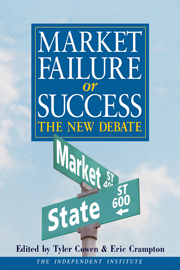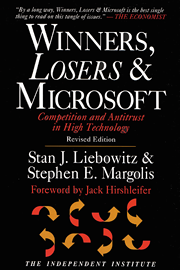OAKLAND, CA—A legal brief filed by its competition suggests that Microsoft Corp. threatens the American way of life. The economic theory behind the paper provides a new basis for government intervention in markets: To save us from being locked into inferior technology.
But under scrutiny, the real-world evidence for the theory melts away like ice cream dropped on a hot asphalt road.
The brief (known as the “white paper”) makes a remarkable claim. “It is difficult to imagine that in an open society such as this one with multiple information sources, a single company could seize sufficient control of information transmission so as to constitute a threat to the underpinnings of a free society. But such a scenario is a realistic (and perhaps probable) outcome.”
The white paper appears to have influenced the Department of Justice, both with respect to Microsoft’s planned (but aborted) acquisition of Intuit, and the current investigation of the Microsoft Network.
The economic foundation for all this is a hypothesis called “path dependence.” This suggests that, in choosing standards and technologies, our market-based economy frequently locks us into bad solutions. The brief takes this much further: one bad lock-in leads to another, leading in the end to great hardship.
The single overriding example of “path dependence” is the typewriter keyboard. The claim is that the creators of the now-standard QWERTY keyboard adopted a design meant to slow down typing speed. The QWERTY design is said to be far inferior to a “scientifically” designed keyboard named after its creator, August Dvorak.
The Dvorak keyboard purportedly provided a 40 percent increase in typing speed. Navy experiments during World War II supposedly showed that the costs of retraining typists on the new keyboard could be fully recovered within 10 days.
But supposedly nobody learns Dvorak because there are no Dvorak machines, and there are no machines because nobody learns Dvorak.
But this ideal case of harmful path dependence is a myth. The QWERTY keyboard, it turns out, is just about as good a design as the Dvorak keyboard. General Services Administration experiments in the 1950s showed that Dvorak held no advantage over QWERTY. Modern experiments in ergonomics yield similar findings.
Most of the claims to the contrary were made by Professor Dvorak himself. The Navy study was conducted under the auspices of the Navy’s chief expert in time-motion studies—Lt. Commander August Dvorak. And the data were clearly manipulated to exaggerate the performance of Dvorak’s keyboard.
Yet the QWERTY keyboard remains the leading example of path dependence, cited in the white paper itself.
Could one ask for better evidence of a theory’s lack of empirical support than the continued use of an example that is known to be wrong?
The other main example of path dependence is the ascendancy of VHS over Beta videorecorders. Beta, it’s said, was a better format; VHS won only because it luckily got a large market share early on in the competition.
Once again, this story doesn’t hold up.
The crucial differences between VHS and Betamax were the size of the videotape cassette and the tape threading. The smaller Betamax cassette initially allowed only one hour of recording capacity—too short for most movies. The larger VHS cassette provided longer recording time for any quality of picture, and could record movies or football games.
Beta was better for special effects and editing, which explains its success in professional markets. But ordinary consumers evidently preferred the longer recording capacity. The market verdict was not a mistake, but rather reflected consumers’ judgments.
Other stories in support of path dependence have been offered, but they are no more believable than the keyboard and videorecorder stories.
“Path dependence” says the market’s choices of products, standards, or technologies are apt to be bad choices. Government help is needed. Taken to extremes, it is suggested these bad choices can compound so as to imperil our basic freedoms. But these theories are highly speculative, and the intimation of Orwellian doom is pure hyperbole.
This doesn’t mean that Microsoft’s business practices shouldn’t be scrutinized. But before we delegate to bureaucracies the job of choosing the direction of technological development, we had best check whether the theories being put forward to support this delegation have any validation in the real world.
More likely, the true danger would come from relying on judges and bureaucrats to choose our technologies, or on lawyers and professors to establish policy.
Our freedoms are far more likely to be abridged by a government that can compel our behavior, than by a corporation that requires, for its own survival, our voluntary purchases of its products.











